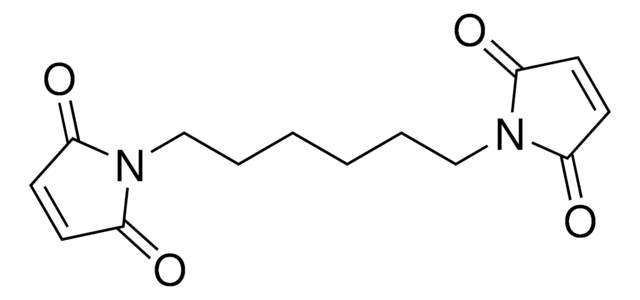909602
DSSO crosslinker
≥95%
Synonyme(s) :
Bis(2,5-dioxopyrrolidin-1-yl) 3,3′-sulfinyldipropionate, Bis-(propionic acid NHS ester)-sulfoxide, Mass spectrometry-cleavable crosslinker for studying protein-protein interations
About This Item
Produits recommandés
Pureté
≥95%
Forme
powder
Disponibilité
available only in USA
Température de stockage
2-8°C
Application
Autres remarques
Development of a novel cross-linking strategy for fast and accurate identification of cross-linked peptides of protein complexes
Structural dynamics of the human COP9 signalosome revealed by cross-linking mass spectrometry and integrative modeling
Developing a Multiplexed Quantitative Cross-Linking Mass Spectrometry Platform for Comparative Structural Analysis of Protein Complexes
Development of a Novel Sulfoxide-Containing MS-Cleavable Homobifunctional Cysteine-Reactive Cross-Linker for Studying Protein–Protein Interactions
Developing an Acidic Residue Reactive and Sulfoxide-Containing MS-Cleavable Homobifunctional Cross-Linker for Probing Protein-Protein Interactions
Informations légales
Produit(s) apparenté(s)
Mention d'avertissement
Danger
Mentions de danger
Conseils de prudence
Classification des risques
Self-react. C
Code de la classe de stockage
5.2 - Organic peroxides and self-reacting hazardous materials
Classe de danger pour l'eau (WGK)
WGK 3
Certificats d'analyse (COA)
Recherchez un Certificats d'analyse (COA) en saisissant le numéro de lot du produit. Les numéros de lot figurent sur l'étiquette du produit après les mots "Lot" ou "Batch".
Déjà en possession de ce produit ?
Retrouvez la documentation relative aux produits que vous avez récemment achetés dans la Bibliothèque de documents.
Notre équipe de scientifiques dispose d'une expérience dans tous les secteurs de la recherche, notamment en sciences de la vie, science des matériaux, synthèse chimique, chromatographie, analyse et dans de nombreux autres domaines..
Contacter notre Service technique









